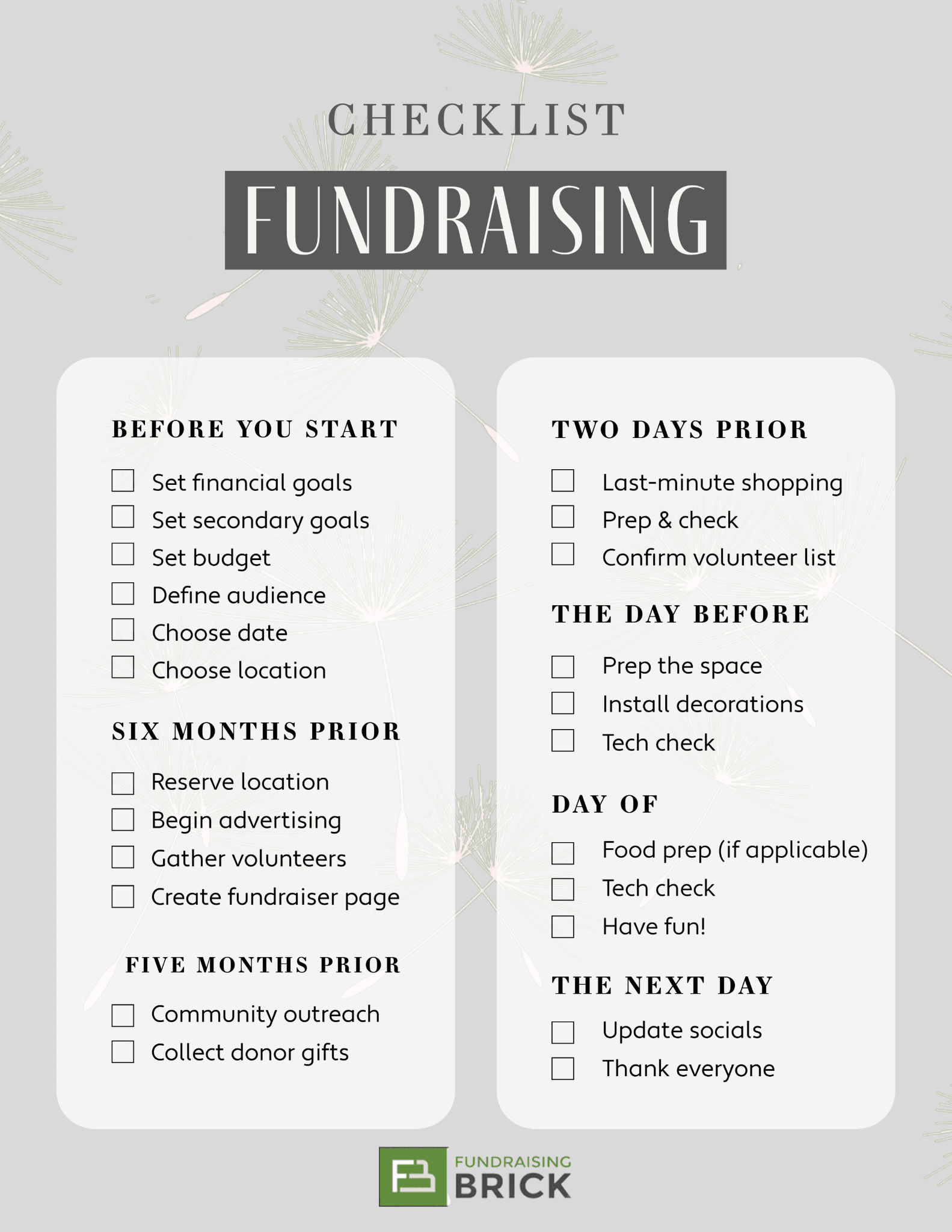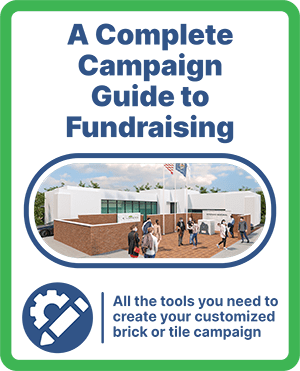The Ultimate Fundraising Toolkit for Nonprofits
We get it; fundraising is hard. But there are resources out there that can help you make planning a fundraiser much easier. Our fundraising toolkit can help you become acquainted with them so you can make an informed decision about which options are best for you and your nonprofit organization.
How Do You Start Planning for a Fundraiser?
As is the case with most things, the hardest part about organizing a fundraiser is getting started.
10 Question to Ask Yourself Before You Begin
Before you can begin laying even the simplest of groundwork, make sure you know why you’re having your fundraiser and what goals you want to achieve. Ask yourself the following 10 questions:
-
What causes are you collecting money or resources for?
-
How will you qualify fundraising success?
-
Are there other fundraising goals besides collecting money, such as increasing brand awareness or fostering a sense of community?
-
Is this event ongoing or is there a deadline?
-
Will people have to register for the event ahead of time?
-
What is your budget?
-
Who is your target audience?
-
Do you need a venue to host the event?
-
How will you get the word out about your event?
-
How will you collect donations?
The answers to these questions will guide your fundraising process moving forward.
Fundraising Checklist
Click here to download our free fundraising checklist.

What Type of Fundraiser Works Best for Your Needs?
There are plenty of ways to raise funds for your nonprofit, and which one is best depends largely on your goals and budget. For example, a fundraiser for a small church might look vastly different from a fundraiser for a large research center–and that’s okay! So long as the fundraising event itself aligns with your goals, mission, and budget, you can’t really make a wrong choice when selecting an event type.
7 Fundraising Ideas
Below are some popular (and easy to organize) fundraising events:
1. Silent auction
A silent auction is a great event for a first-time fundraising committee, and it is flexible enough to meet several goals. For starters, these events are easy enough to host in a socially distanced manner, likely making the event compliant with your chosen venue’s COVID-19 regulations. Secondly, while you can ask participants to sign up for the event ahead of time, registration isn’t required.
Perhaps best of all is the fact that since people can donate auction items, you can make this event work on even a shoestring budget. Allowing people to donate to the auction also allows for community engagement, as local businesses may be interested in donating gift certificates to your cause. The bottom line? You save money while your participants have a wide range of items to auction on.
PROS
-
Great for community engagement
-
Offers donors the opportunity to receive a tangible gift
-
Easy to organize
-
Can be socially distanced
-
Works for smaller organizations and smaller budgets
-
Can be socially distanced
CONS
-
Requires a space large enough to host the event
-
Requires either a large budget to buy auction items or the large-scale donations of community members
2. 50/50 Raffle
A 50/50 raffle is one of the easiest events to organize as it doesn’t necessarily require a physical venue or in-person participation; everything can be done digitally! With a raffle, you can easily raise money in a short amount of time with little effort. All you need to do is sell tickets–either in person or online–and then contact the winner(s) once you draw the winning ticket(s). Better yet, sometimes winners give their 50% of the raffle back to your cause, meaning more money for your organization!
PROS
-
Can be socially distanced
-
Can be held online or in person
-
Low-cost event
-
Can engage outside your target audience
CONS
-
Requires excellent record-keeping
-
Works best with many volunteers
3. Bake sale
There’s no fundraiser quite as sweet as a bake sale. It’s a low-cost event that can generate plenty in donations while also engaging your community in a fun way. Best of all, bake sales are incredibly popular since participants are guaranteed to walk away with something tangible, meaning more people are likely to participate.
PROS
-
Low-cost event
-
Easy community engagement
-
Donors receive something tangible
CONS
-
Requires donations (baked goods) to work
-
Needs a venue large enough to host the event
4. Crowdfunding
Casting a wider net may be some organization’s best bet to get more potential donors; crowdfunding is one way to cast that net. This online fundraising event allows anyone who knows about the event to donate. Plus, the online nature of crowdfunding means it’s perfect for keeping people safe from COVID-19. The biggest drawback to crowdfunding is that you have to take extra precautions to keep your donors’ financial information.
PROS
-
Easy to set up online
-
Low-cost event
-
Wider reach than many other fundraising events
CONS
-
Less personalized and engaging than other events
-
Harder to keep donor information secure
5. Trivia night
A trivia night is a flexible, fun community event that any size organization can host. Depending on your target audience, you can make this event either family friendly or adults only. In fact, you may be able to host multiple events for multiple groups!
Trivia nights can generate revenue in the form of ticket sales, which you can do in advance or in person at the event itself. What’s great about these ticket sales is that you can adjust pricing to fit your goals. Prizes are easy as well. You can either buy something ahead of time with your fundraising budget, ask for local businesses to donate prizes like gift certificates or gift baskets, or you can even set aside a portion of the revenue to gift your winning team(s).
PROS
-
Flexible
-
Low-cost event
-
Easy to organize
CONS
-
Requires a larger venue
6. Car wash
A classic car wash is a low-cost way to raise money for your organization while offering a tangible benefit to your donors. This event is perfect for volunteers of all ages, making it a great option for organizations like youth groups.
PROS
-
Offers tangible services to donors
-
Perfect for smaller budgets
-
Allows for volunteers of all ages
CONS
-
Dependent on the weather
-
Requires outdoor venue
7. Brick fundraiser
If you want a unique fundraiser that gives your donors a lasting legacy, you need look no further than a brick fundraising event. With a brick fundraiser, participants purchase bricks that they can personalize; these bricks will then be incorporated into a larger project, such as a new sidewalk. These events are perfect for facilities that need remodeling.
Shameless plug: We here at Brick Fundraiser know the ins and outs of crafting the perfect brick fundraising event. If you’ve hit a brick wall trying to create a unique fundraising event, we can help you out. Just go here to download our FREE fundraising packet so we can help you get started on your fundraising journey.
PROS
-
Unique and memorable
-
Gives donors a lasting, tangible gift
-
Great for remodeling projects
CONS
-
Won’t work for organizations that don’t have a permanent, physical headquarters
10 Event-planning Resources
Whether this is your first or fifth fundraiser, having a little extra help can make the process of setting one up much easier. Fortunately, there are plenty of software solutions available to help you fundraise every step of the way.
5 Event-organizing Platforms
When it comes to event-organizing solutions, the following are great options for most budgets:
1. Eventbrite
Eventbrite is a great tool for first-time event organizers. It has just about everything in its toolkit, including:
-
Event creation software
-
Ticket management
-
Customizable event pages
-
Email campaign services
Even better, Eventbrite knows that different organizations have different budgets. That’s why they offer various packages at multiple price points to meet the needs of various budgets.
2. Salsa CRM
Salsa offers various tools to meet your organization’s goals, including:
-
Marketing automation
-
Peer-to-peer fundraising
-
Online fundraising
-
Donor management
-
Online event registration
In addition to offering services and solutions, Salsa also offers other resources, such as informational webinars, case studies, and more!
3. Kindful
Kindful is great for nonprofits that already utilize other tools. What makes Kindful helpful is that it can bring together other resources and platforms to make event management much more streamlined.
Their solutions include:
-
Fundraising tools
-
Integrated CRM
-
Donor communication services
-
A tracking and reporting dashboard
4. Bloomerang
Thousands of nonprofit organizations trust Bloomerang for donor management. Their donor management system offers:
-
Online giving tools,
-
Email marketing services,
-
Smart reports,
-
And more!
5. NeonCRM
If you want a robust nonprofit management solution, NeonCRM is worth exploring. They offer solutions to help you manage events, websites, fundraising, and more.
5 Money-collecting Software Solutions
Perhaps the most important question to ask yourself is how you are going to collect donations. If you are going to collect in-person donations like cash and checks, make sure that a trusted member of your staff, preferably an accountant, handles them.
For online donations, the following options are worth exploring:
1. PayPal, Venmo, or Cash App
Sometimes the best solution is the simplest solution. PayPal, Venmo, and Cash App are widely trusted “digital wallets” that allow people to easily send or request money. They’re popular enough that many, if not most, of your potential donors are already familiar with these platforms. When using these tools for your fundraiser, make sure that your donors know exactly where to send their donations.
2. Fundly
Fundly helps you create a fundraising event page in addition to managing actual donations. You can even connect this platform to Facebook. It’s great if you want to have your event page, campaign services, and donation tools in one place.
Note that Fundly deducts a 4.9% fee from each donation and a small credit card processing fee of 2.9% + $0.30. While these fees do cut into your profits, they have the benefit of not passing on the costs to the donors.
3. GoFundMe
GoFundMe has practically become synonymous with fundraisers, and for good reason: it’s incredibly easy to use for organizers and donors alike. If you’re thinking of crowdfunding, GoFundMe is a tried-and-true solution.
4. DipJar
If the previous three options didn’t interest you, DipJar might. It not only offers cashless donation management solutions, but also helps you find new audiences and creative ways to engage with them both online and in person.
5. Donorbox
Donorbox is a nonprofit fundraising software that creates a donation button on your website. It allows for multiple types of donations–including PayPal, Google Pay, and cards–and even offers donors the option to donate on a recurring basis.
How Do You Attract (and Keep) Donors?
Fundraisers won’t work without donors. So, it’s important to prioritize not only finding new potential donors, but keeping a loyal base of repeat donors for future fundraising campaigns.
5 Tips for Raising Event Awareness
It doesn’t matter how awesome your event is; if no one knows about it, your fundraising efforts will all be for nothing. That’s why it’s important to raise awareness for your event well ahead of time to reach the largest possible number of potential donors.
-
Start well ahead of time. This way, you have time to deal with any surprise setbacks and your potential donors can mark their calendars early.
-
Make plenty of social media posts across multiple social accounts on various platforms, such as Twitter, Facebook, Snapchat, or even LinkedIn, depending on your target audience.
-
Create hashtags for your event or use popular hashtags, like #GivingTuesday, to reach a wider online audience.
-
Have volunteers hand out physical promotional materials, such as pamphlets, in person at community locations, such as a park or town square.
-
Create a fundraising page on your organization’s website.
Donor gifts
Everyone likes to win; that’s why fundraising campaigns that offer donor gifts are so popular. Depending on your organization’s resources, you can offer gifts like:
-
Monogrammed throws
-
Key chains
-
Branded water bottles
-
Thank you dinners
-
Success stories from beneficiaries
-
Thank you cards or videos
Say thank you!
Take your organization to the next level by sending donors and volunteers alike thank you messages. These messages can either be given through email–which allows the option for video formats–or handwritten cards that can either be mailed or passed out at the event itself.
A thank you lets everyone know how much you valued their contribution, which can make them more loyal to your organization down the road. If you plan on hosting future fundraising events, retaining donors is necessary. After all, with repeat events, your best source of potential donors are participants from previous years.
What are the Hidden Costs of Fundraising?
It takes money to make money. Unfortunately, creating a fundraising event isn’t possible without some sort of starting budget. Costs associated with fundraisers include:
-
Opportunity cost
-
Transaction fees for online donation platforms
-
Rental fees for venues
-
Paying workers for the event if there are not enough volunteers
-
Advertising costs
-
Buying and mailing donor gifts
-
Subscription fees for fundraising platforms
-
Upkeep costs for fundraising pages
5 Pro Bono Resources for Nonprofit Fundraisers
With so many hidden costs, it can be intimidating for smaller nonprofits to even get started on a successful fundraising campaign. Fortunately, there are plenty of pro bono, or free, resources available for nonprofits.
Finding these pro bono resources can be tricky, though… unless you find a tool to help pair you with a pro bono service that aligns with your nonprofit’s mission and goals. You can find pro bono or skilled volunteer services by using one of the following programs:
Final Thoughts
There’s no one-size-fits-all approach to fundraising. What’s important is that you find something that works for your event. Keeping in mind your organization’s mission, fundraising goals, and budget can all help you streamline the event-planning process. Now that you’ve got the hardest part–getting started–out of the way, you can rest easy knowing the process only gets easier from here.




